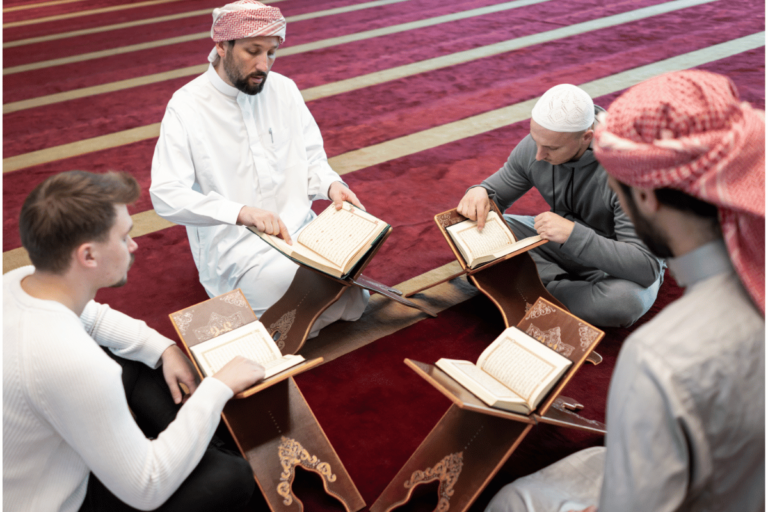Islam and Self-Reflection: Examining the Heart and Seeking Spiritual Growth
Starting on a journey of self-reflection within Islam allows you to uncover deep insights into the heart, fostering spiritual growth and strengthening your connection with Allah. It serves as a pathway towards enlightenment, encouraging mindfulness and self-improvement. By purifying your inner self and nurturing a closer bond with the divine, you can navigate inner struggles, seek forgiveness, and aim for personal development. Recognizing the stages of the Nafs and engaging in self-examination pave the way for a more profound spiritual connection. This journey of introspection in Islam holds transformative power for those seeking spiritual growth.
Key Takeaways
- Self-reflection in Islam fosters spiritual growth and deepens connection with Allah.
- Nafs guides self-awareness and inner purification for spiritual enlightenment.
- Purification of the soul involves identifying negative traits and seeking knowledge.
- Seeking forgiveness through self-accountability is crucial for moral development.
- Prophetic guidance emphasizes introspection for overcoming obstacles and spiritual growth.
The Significance of Self-Reflection in Islam
Self-reflection plays a significant role in Islam as it encourages believers to introspect, seek spiritual growth, and deepen their connection with Allah. Within the Islamic tradition, self-reflection is seen as an inner journey towards self-awareness and spiritual enlightenment. It involves mindfulness practices that help individuals cleanse their hearts and attain a higher level of consciousness. By engaging in self-reflection, Muslims aim for a spiritual awakening that allows them to purify their intentions, thoughts, and actions.
The concept of self-reflection in Islam goes beyond mere introspection; it involves a profound examination of one's relationship with Allah. Through introspective practices, individuals undertake a journey of self-discovery that leads to a better understanding of their purpose in life and their connection to the divine. This process of heart cleansing is essential for nurturing a deep sense of spirituality and achieving inner peace. By delving into the depths of their souls, believers can address their shortcomings, improve their character, and ultimately draw closer to Allah.
The Concept of Nafs in Islamic Self-Reflection
When considering the concept of Nafs in Islamic self-reflection, you're encouraged to delve into the intricate relationship between the soul and spiritual growth.
By acknowledging the significance of Nafs, you initiate the profound journey of purifying your inner self and nurturing a deeper connection with the divine.
Through introspection and self-awareness, you set out on a transformative path towards understanding the complexities of the soul and its role in shaping your spiritual evolution.
Nafs and Spiritual Growth
In the journey of spiritual growth within Islam, understanding the concept of Nafs plays a pivotal role in guiding individuals towards self-awareness and self-improvement.
The Nafs, often translated as the self or ego, represents the inner journey that every individual initiates on to attain spiritual development. It's a fundamental element in Islamic teachings as it reflects the struggle between the desires of the self and the pursuit of spiritual enlightenment.
By recognizing the different stages of the Nafs, individuals can navigate their inner struggles, working towards purifying the heart and aligning themselves with the teachings of Islam.
This introspective process of self-reflection helps believers in cultivating a deeper connection with Allah and ultimately leads to personal growth and spiritual fulfillment.
Purification of the Soul
The journey towards spiritual growth in Islam necessitates a deep exploration of the concept of Nafs, delving into the core of self-awareness and inner purification. Understanding the Nafs is essential for achieving inner peace and soul cleansing.
- Self-Reflection: Regular introspection helps identify negative traits within oneself, paving the way for improvement.
- Prayer and Meditation: Engaging in deep prayer and meditation aids in calming the Nafs and achieving a state of tranquility.
- Seeking Knowledge: Continuous learning about the teachings of Islam and reflecting on them assists in purifying the soul and fostering spiritual growth.
Purification of the Heart in Islam
Engaging in the process of purifying the heart according to Islamic teachings involves a profound journey of self-reflection and spiritual growth. Heart cleansing, known as 'Tazkiyah al-Qalb' in Arabic, is central to Islam's emphasis on inner purity and moral integrity. The purification of the heart isn't merely a ritualistic act but a continuous effort to cleanse oneself from negative traits such as envy, arrogance, and greed, replacing them with virtues like compassion, humility, and generosity.
In Islamic tradition, the heart is considered the seat of human consciousness and the center of spiritual awareness. By purifying the heart, one aims to align their intentions and actions with the teachings of Islam, fostering a deeper connection with the divine. This process requires sincere introspection, repentance for past wrongdoings, and a commitment to self-improvement.
Through acts of worship, remembrance of God, and serving others with kindness and compassion, Muslims seek to purify their hearts and attain spiritual growth. Inner purity isn't only a personal endeavor but also a means of fostering harmony within communities and promoting a more just and compassionate society.
Seeking Forgiveness Through Self-Reflection
Setting out on a journey of introspection and repentance, you explore the depths of your soul to seek forgiveness through self-reflection in Islam. Seeking repentance involves acknowledging past wrongdoings, feeling genuine remorse, and actively endeavoring to change for the better. This process of inner transformation requires sincere efforts to rectify mistakes and seek forgiveness from both the Divine and those who may have been wronged.
In Islam, heartfelt introspection plays an essential role in seeking forgiveness. By delving deep into your thoughts and actions, you can identify areas where you have fallen short and take steps to rectify them. This introspective practice not only leads to seeking repentance but also fosters personal growth and spiritual development.
Divine mercy is a central theme in the process of seeking forgiveness through self-reflection. Understanding and believing in the boundless mercy of the Divine can provide solace and hope during moments of guilt and regret. It's through this belief in divine mercy that one can find the strength to continue on the path of self-improvement and forgiveness.
Self-Accountability in Islam
In Islam, self-accountability serves as a cornerstone of spiritual growth and moral development, prompting individuals to reflect on their actions and take responsibility for their choices. Self-awareness plays an essential role in this process, as it requires a deep examination of one's intentions and behaviors. By holding oneself accountable, individuals engage in a continuous cycle of personal growth and reflection, aiming to align their actions with the teachings of Islam.
The concept of self-accountability in Islam goes beyond mere acknowledgment of one's mistakes; it involves actively seeking opportunities for improvement and making amends for any wrongdoings. This introspective practice fosters a sense of humility and sincerity, enabling individuals to cultivate a stronger connection with their faith and community.
Through self-accountability, Muslims can assess their progress on the spiritual path and identify areas that require attention and improvement. This ongoing self-assessment not only aids in individual growth but also contributes to the overall betterment of society by fostering a culture of integrity and responsibility.
Using Prayer for Self-Reflection
To deepen your self-reflection in Islam, harness the power of prayer as a transformative tool for introspection and spiritual growth. Prayerful introspection allows you to explore the depths of your soul, seeking clarity and connection with the Divine. Through inner contemplation during prayer, you can achieve a deeper understanding of your actions, intentions, and relationship with Allah.
Key Points:
- Silent Reflection: Take moments of silence during prayer to ponder on your thoughts and emotions, identifying areas for improvement and gratitude.
- Seek Forgiveness: Use prayer as a means to seek forgiveness for any wrongdoings or shortcomings, fostering a sense of humility and accountability.
- Set Intentions: Before beginning your prayer, set clear intentions to focus your mind and heart, aligning your actions with your spiritual goals.
Through prayerful introspection and inner contemplation, you can cultivate self-awareness, humility, and spiritual growth, paving the way for a more fulfilling and purposeful journey in Islam.
Prophetic Guidance on Self-Examination
Drawing from the teachings of the Prophet Muhammad, self-examination in Islam serves as a guiding light for believers seeking spiritual growth and moral refinement. Prophetic wisdom emphasizes the importance of introspection and self-awareness as key elements of the inner journey towards self-improvement. The Prophet Muhammad himself engaged in deep reflection and encouraged his followers to do the same, recognizing that true spiritual growth begins with a sincere examination of one's own thoughts, actions, and intentions.
Prophetic guidance on self-examination involves looking inward with honesty and humility, acknowledging one's strengths and weaknesses, and endeavoring to align one's behavior with the teachings of Islam. This process of introspection is a transformative experience that allows individuals to identify areas for improvement and make positive changes in their lives. By following the example set by the Prophet Muhammad, believers can navigate their inner journey with purpose and intention, continuously seeking to better themselves in the eyes of Allah.
Overcoming Spiritual Obstacles Through Reflection
Reflecting on your spiritual journey can illuminate the path to overcoming obstacles and deepening your connection with the divine. In Islam, the journey towards spiritual growth involves moving through various spiritual barriers that hinder inner transformation. Through reflection, you can identify and address these barriers, paving the way for personal development and a closer relationship with Allah.
- Identifying Spiritual Barriers: Take time to reflect on the internal struggles and doubts that may be impeding your spiritual growth. Recognizing these barriers is the first step towards overcoming them.
- Seeking Inner Transformation: Engage in introspection and self-assessment to foster inner transformation. By acknowledging your weaknesses and working towards improvement, you can gradually transcend spiritual obstacles.
- Embracing Personal Development: View each challenge as an opportunity for growth and learning. Embrace the process of self-reflection as a means to continually evolve spiritually and cultivate a deeper connection with your faith.
Self-Reflection Practices in Daily Life
Engage in daily self-reflection practices to deepen your spiritual awareness and enhance your connection with the divine. By incorporating mindful living into your daily routine, you can cultivate a more introspective approach to life. Begin each day with a moment of quiet contemplation, focusing on your intentions and aligning them with your spiritual values. Throughout the day, take short breaks to center yourself, reflect on your actions, and realign your thoughts with your faith.
Incorporating introspective practices into your daily life allows you to examine your thoughts, emotions, and behaviors through a spiritual lens. This process enables you to identify areas for growth, seek forgiveness for shortcomings, and express gratitude for blessings. By engaging in regular self-reflection, you can develop a deeper understanding of yourself and your relationship with the divine.
Mindful living encourages you to be present in each moment, to act with intention, and to approach challenges with a spiritually grounded perspective. Through introspective practice, you can foster a sense of inner peace, strengthen your connection to your faith, and nurture spiritual growth in your daily life.
Conclusion
As you aim for spiritual growth through self-reflection in Islam, remember that the true irony lies in the fact that the more you examine your heart, the more you realize how much there's to learn and improve upon.
Embrace this journey of self-discovery with humility and perseverance, knowing that the depths of your soul hold endless opportunities for growth and transformation.
Keep seeking, keep reflecting, and watch as your spirit blossoms in ways you never thought possible.







